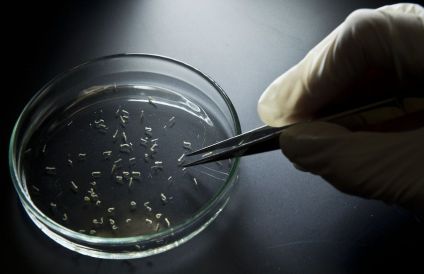For weeks, world and U.S. health authorities were saying there are five things everyone needs to know about Zika. Here’s No. 6: sex. And the Centers for Disease Control and Prevention and World Health Organization knew about the potential blockbuster health threat involving Zika and sexual intercourse since at least 2008.
More recently, scientists in French Polynesia isolated the virus in the semen of a man who was ill with Zika in December 2013. The CDC published the findings in February 2015. But the CDC waited until Friday to alert the public, including frontline health workers, about scientific evidence that shows Zika can be transmitted during sexual activity, including saliva, and also blood transfusions.
 » DAILY FRAY: Zika: Hurts like dengue, can spread through sex (June 2015)
» DAILY FRAY: Zika: Hurts like dengue, can spread through sex (June 2015)
"Sexual transmission of Zika virus is possible, and is of particular concern during pregnancy," the CDC said Friday in an amended set of guidelines to control Zika.
The CDC acknowledged research by Dr. Didier Musso, who managed a Zika outbreak in 2013-14 as director of the Diagnosis Medical Laboratory at Louis Malardé Institute in Tahiti. “Our findings support the hypothesis that [the Zika virus] can be transmitted by sexual intercourse,” Musso wrote in the CDC's journal, Emerging Infectious Diseases.
In an interview published Feb. 3 by an online medical forum, Musso stopped short of saying world health officials were slow-footed regarding preventive action against Zika.
"It would be pretentious on our part to say, yes," Musso said. "We had written it in 2014 in the journal Clinical Microbiology and Infection. I quote: 'We believe that the circulation of Zika in other regions of the Pacific and probably beyond is highly likely' ... For all diseases transmitted by mosquitoes, the problem is the same: to reduce mosquito populations. That goes for Zika, chikungunya, dengue, malaria, yellow fever."
On Feb. 2, health officials in Texas confirmed that a person was infected with Zika through sexual intercourse. The patient had sex with a person who was infected with Zika in Venezuela, Dallas County health officials said.
“It is very rare, but this is not new,” Zachary Thompson, director of Dallas County Health and Human Resources, told a Dallas TV station. “We always looked at the point that this could be transmitted sexually."
Through Feb. 12, Florida health officials were able to confirm 20 cases of travel-related Zika in eight counties: Alachua, Broward, Hillsborough, Lee, Miami-Dade, Osceola, St. Johns, and Santa Rosa. Nationwide there are more than 50 Zika cases.
Florida Gov. Rick Scott has declared a limited health emergency, saying at a press conference, "We have to ensure that Florida's safe. Just like in a hurricane, we always say to ourselves, 'We'll prepare for the worst and hope for the best.' And we're going to do everything we can to stay ahead of the Zika virus."
On Thursday that included a Zika education teleconference between CDC officials and Florida hospitals. New guidelines call for physicians to warn patients to abstain from sex or for male partners to wear protection, particularly for anyone who recently traveled to a Zika-affected area.
On Friday, the state activated a 24-hour Zika information hotline — 855-622-6735
Scott also recently called for extra measures for mosquito control. The CDC has rushed at least 1,000 antibody test kits to check Floridians who have traveled abroad and have symptoms of Zika — especially pregnant women.
The World Health Organization did not publically flag potential sexual transmission of Zika when declaring the outbreak a global emergency Feb. 1 in a special meeting. The Pan American Health Organization issued a high alert in May 2015 after Zika was first observed in Brazil — the first case of the virus in the Americas.
Zika is also linked to a rare birth defect, microcephaly, and Guillain-Barré syndrome.
But the Zika case in Texas is not the first involving sex.
A Colorado researcher was infected with Zika while studying mosquitoes in Senegal in 2008. After returning to the U.S., his wife became ill. The U.S. National Institutes of Health said the couple were the first confirmed case of an insect-borne disease transmitted through sex.
Zika spread for the first time to the Caribbean in June after a 12-year-old girl in the Dominican Republic was diagnosed. At the time, Zika was not on the Florida Department of Health’s list of worrisome mosquito-borne illnesses.
Until recently neither was chikungunya, which spread locally in Florida for the first time in 2014. It was also the first case in the U.S. outside of Puerto Rico and the U.S. Virgin Islands.
Signs of the disease include fever, rash, and conjunctivitis but a Zika infection is considered physically tolerable compared to dengue, according to the CDC. Joint and muscle pain and swelling are intense but last only a few days. Shock and bleeding are uncommon. And worldwide, no deaths.
Zika was identified in 1947 in a rhesus monkey in the Zika Forest in Uganda. The first cases in humans were in 1952 in Uganda and Tanzania.
Outside
Bitcoin mining emissions in China will hit 130 million tonnes by 2024 https://t.co/w6He7so8N2 pic.twitter.com/qYUDtBdeRK
— New Scientist (@newscientist) April 9, 2021
The Gunk Report
For the Blue-Green Algal Bloom Weekly Update from the Florida Department of Environmental Protection, tap here. For DEP's Algal Bloom Sampling Map, tap here.
What, me worry?
» "PLAYING WITH SHARKS," which recently premiered at the Sundance Film Festival, documents diving legend Valerie Taylor.